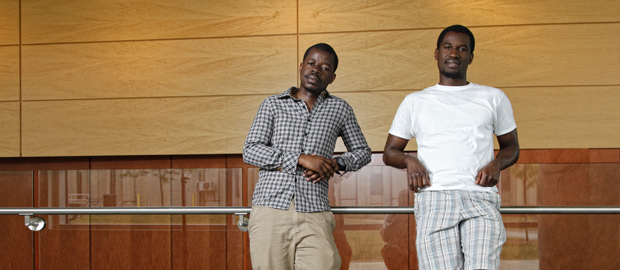Uniting physics, business for the greater good
Two Rwandan students join the laws of physics and the principles of business for the greater good.
 Photo/Mike Lovett
Photo/Mike Lovett Camille Girabawe and Bernard Hishamunda
An object in motion stays in motion … — Newton’s First Law of Motion.
Bernard Hishamunda isn’t the type to stand still or let obstacles slow his pace. He’s the type who, when admitted to Rwanda’s most elite university, the Kigali Institute of Science and Technology (KIST), opened a small business to help pay tuition, and when that wasn’t enough, worked as a DJ and documentary filmmaker.
Hishamunda is the type who, when sensing the limits of Rwandan education, moved across the globe to a new culture and climate to pursue a PhD. And when all that wasn’t enough, he made perhaps the biggest leap of all — from a science lab to a business school classroom.
Energy cannot be created or destroyed, only changed — the First Law of Thermodynamics.
As a young man, Camille Girabawe was on a path to join the priesthood in Rwanda. His parents enrolled him in a seminary and encouraged him to apply his mind to faith. But Girabawe had other uses for his energy. He wanted to understand the natural world, to solve hidden problems, to challenge himself with obscure topics.
Begrudgingly, his parents allowed him to attend a secular high school, where he met Hishamunda, and later, enrolled with him at KIST. When Girabawe joined Hishamunda at Brandeis to pursue a PhD in physics, he chose to study chemical oscillation, a subject about which he knew nothing.
“When it was explained to me, I did not understand it at all,” he recalls. “That is when I decided to study it. I knew I would have to use all my energy to understand this topic.”
On the surface, Girabawe and Hishamunda couldn’t be more different. Hishamunda is quick to smile and easy to laugh. Girabawe is thoughtful and serious, easy to imagine wearing the cloth. But the two men share a passion for harnessing science and research to improve lives, especially in their native Rwanda.
It was a Brandeis professor who recognized their passion.
In 2009, Girabawe and Hishamunda took a class together on quantum physics at KIST, taught by Brandeis professor Seth Fraden, PhD’87, who was visiting Rwanda as a guest lecturer. Brandeis’ and KIST’s physics departments formally agreed to help provide Rwandan students with postgraduate training.
Fraden, impressed by Girabawe and Hishamunda, encouraged them to apply to Brandeis, touting its commitment to research and social justice. With Fraden’s support, the friends took the GREs, applied to Brandeis and arrived on campus in June 2011 as doctoral candidates.
They threw themselves into research — Girabawe studying chemical oscillation in Fraden’s lab, Hishamunda studying active matter in professor Zvonimir Dogic’s lab.
Soon, they began struggling with a question: How could they continue their work in Rwanda, a place with no science funding but a desperate need for the fruits of research? If they wanted to grow the scientific community in Rwanda, they needed to learn how to get funding as well as promote corporate investment in research — in short, they needed to merge the common interests of science and industry. They needed business.
“A lot of people, and not just Rwandans, think research and business are incompatible,” Hishamunda says. “But I believe that you can be an entrepreneur and a researcher. In fact, it’s necessary to be both to develop products that help people in their daily lives.”
The two began taking finance classes at the Brandeis International Business School to supplement their science training and prepare them to return to Rwanda. Even though the classes don’t count towards a degree — international students may not enroll in simultaneous degree programs — Girabawe and Hishamunda say they have been supported throughout the process.
“Brandeis as a whole, the physics department, and especially professor Fraden, support the idea of getting more African students involved in promoting scientific research,” Girabawe says. “A country in the process of developing economically and socially needs problem solving. That is what research, especially fundamental research, can provide.”
“All of my life, I have heard that Africa isn’t going anywhere,” Hishamunda says. “It is the forgotten land. But now, we young Africans are starting to do our part to change people’s lives. We can be the force that pushes our countries forward.”
Categories: Business, Research, Science and Technology





